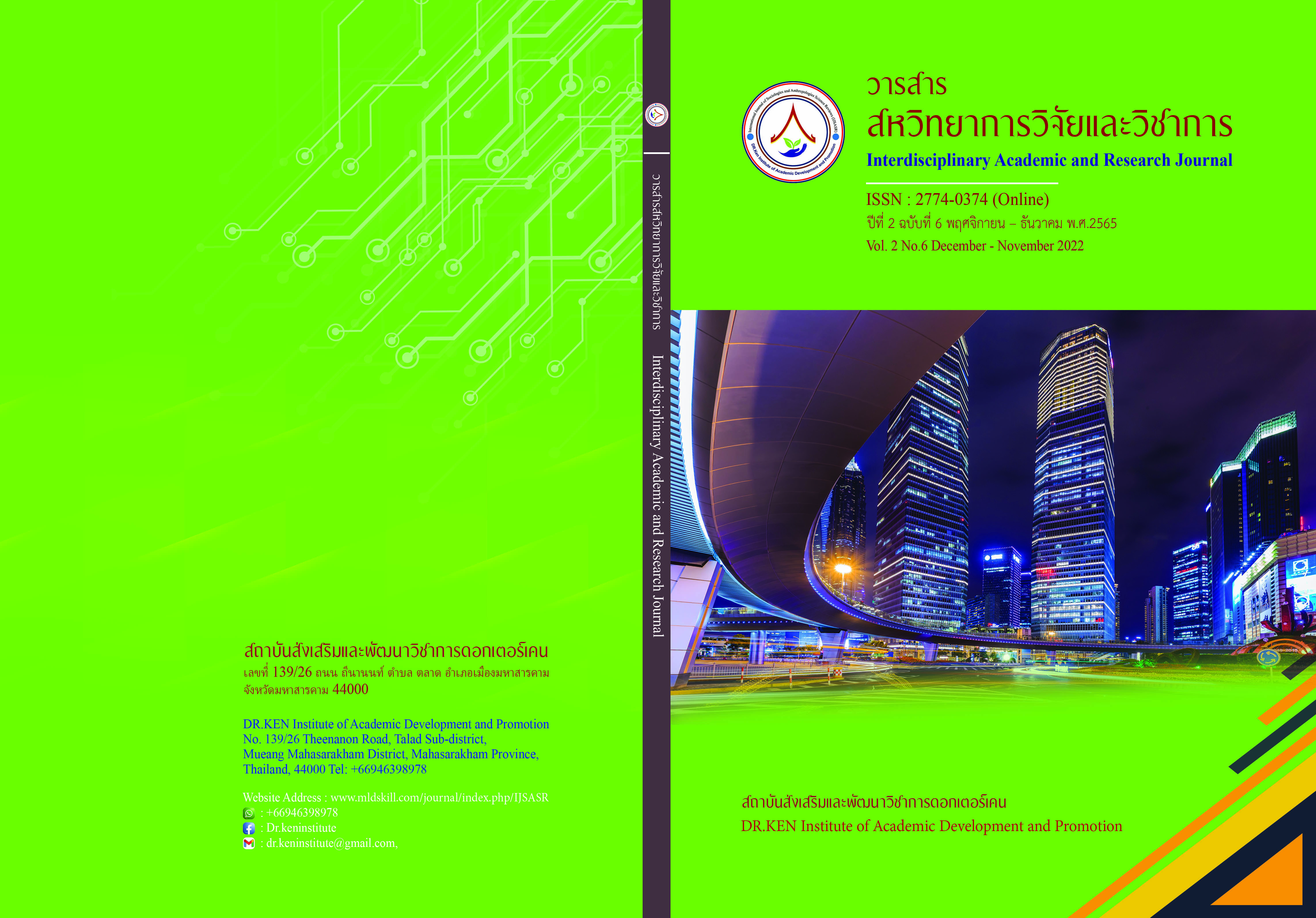Knowledge Management Model for Cultural Tourism Development Homestay Style of Phu Tai Ethnic Group
DOI:
https://doi.org/10.14456/iarj.2022.138Keywords:
Knowledge Management Model; , Cultural Tourism; , Phu Tai Ethnic GroupAbstract
The tourism promotion policies of the tourism authority of Thailand 2017-2021, are consistent with national guidelines, as can be seen from the promotion of tourism as an essential tool in solving economic problems. create jobs for people and increase income for the country. the homestay is a business that provides accommodation and tours in a way that allows you to experience the local people's way of life and closely experience the nature, environment, culture, traditions, and values of the community. these are essential factors contributing to the provision of ecotourism business services. Thus, this research was to (1) Study the model of knowledge management for the development of homestay cultural tourism of the Phu Tai ethnic group; (2) Study the factors and conditions related to the knowledge management model for the development of cultural tourism. (3) Synthesize a model of knowledge management for the development of homestay cultural tourism of the Phu Tai ethnic group that is suitable for the Thai social context. By using a qualitative research model, the research area is an area of 8 Phu Tai cultural villages in Roi Et Province, Kalasin and Mukdahan provinces which derived by specific selection. The tools used were questionnaires and interview forms. The data were analyzed by descriptive statistics. The results of the research found that (1) knowledge management for tourism development has 4 aspects of knowledge management, namely: 1) the resources for the Phu Tai community, 2) creating activities and learning processes for tourists, 3) managing the network, and 4) income and benefits management; (2) Conditional factors affecting the knowledge management model, namely 1) the context of the Phu Tai community 2) the role of leadership 3) the organization's knowledge management 4) being a learning organization 5) the technology and tools used in knowledge management; 6) the support of government agencies, and 7) the support of external academics. And (3) Knowledge management model for cultural tourism development homestay style of Phu Tai ethnic group appropriate to the Thai social context was found that the Phu Tai community that was able to manage knowledge at a good level had 6 stages: seeking knowledge, knowledge building, knowledge transfer, knowledge storage, using knowledge, and assessment of knowledge management.
References
การท่องเที่ยวแห่งประเทศไทย. (2560). นโยบายและแนวทางการพัฒนาการท่องเที่ยวเชิงอนุรักษ์. กรุงเทพฯ : การท่องเที่ยวแห่งประเทศไทย.
จตุพร หล้าใจ. (2550). กระบวนการเรียกร้องสิทธิการจัดการทรัพยากรธรรมชาติของชุมชนในพื้นที่ลุ่มน้ำฝาง. วิทยานิพนธ์ปริญญามหาบัณฑิต : มหาวิทยาลัยเชียงใหม่.
ชูศักดิ์ อินทมนต์. (2562). รูปแบบการจัดการธุรกิจนวัตกรรมโฮมสเตย์ในชุมชนสำหรับนักท่องเที่ยว. วารสารมหาวิทยาลัยศิลปากร. 39(6), 85-103.
ณัฐชา ธนาภรณ์, กัญญ์พัสวี กล่อมธงเจริญ, ภูษณิศา เตชเถกิง และปรีดา ศรีนฤวรรณ. (2564). กลยุทธ์การจัดการธุรกิจโฮมสเตย์ ภายใต้สถานการณ์โควิด 19 กรณีศึกษา หมู่บ้านแม่กำปอง จังหวัดเชียงใหม่. รายงานวิจัย. เชียงใหม่ : มหาวิทยาลัยแม่โจ้.
ประภาพรรณ อุ่นอบ. (2549). หน่วยการจัดการความรู้ภาคประชาสังคม. ฝ่ายติดตามประเมินผลภายในและสังเคราะห์องค์ความรู้ โครงการวิจัยและพัฒนาชีวิตสาธารณะท้องถิ่นน่าอยู่. กรุงเทพมหานคร: พี.เอ. ลิฟวิง.
ยุวนุช ทินนะลักษณ์. (2549). ปริศนาภูมิปัญญาท้องถิ่น. กรุงเทพฯ: สถาบันวิถีทรรศน์.
ระชานนท์ ทวีผล. (2562). แนวทางการจัดการอัตลักษณ์โฮมสเตย์ไทย กรณีศึกษาจังหวัดเพชรบุรี และจังหวัดประจวบคีรีขันธ์. วารสารสถาบันวิจัยและพัฒนา มหาวิทยาลัยราชภัฏเลย. 14(48), 22-33.
วิชชุดา ให้เจริญ. (2556). การจัดการท่องเที่ยวแบบโฮมสเตย์เพื่อการอนุรักษ์สิ่งแวดล้อม กรณีศึกษา : ชุมชนเกาะยาวน้อย จังหวัดพังงา. วิทยานิพนธ์ศึกษาศาสตรมหาบัณฑิต : มหาวิทยาลัยทักษิณ.
สงกรานต์ ถุงแก้ว. (2550). การพัฒนาศักยภาพโฮมสเตย์เพื่อส่งเสริมการท่องเที่ยวธรรมชาติ บ้านต้นเกลือ อำเภอลับแล จังหงัดอุตรดิตถ์. รายงานวิจัย. อุตรดิตถ์ : มหาวิทยาลัยราชภัฏอุตรดิตถ์.
สุภาภรณ์ ประสงค์ทัน. (2556). ทุนทางสังคมกับแนวทางการส่งเสริมการท่องเที่ยวโดยชุมชนเชิงสร้างสรรค์: กรณีศึกษาชาวไทยพวน อ.ปากพลี จ.นครนายก. วารสารสังคมศาสตร์ มหาวิทยาลัยศรีนครินทรวิโรฒ. 16 (1).
Meyer, M., & Zack, M. (1996). The design and implementation of information products. Sloan Management Review. 37 (3), 43 – 59.
Wiig, K. (1993). Knowledge Management Foundations. Arlington, TX: Schema Press.
Downloads
Published
How to Cite
Issue
Section
License
Copyright (c) 2022 บุญช่วย มหิวรรณ, วิมลมาศ ปฐมวณิชกุล, ทิพาพร สุจารี

This work is licensed under a Creative Commons Attribution-NonCommercial-NoDerivatives 4.0 International License.
Copyright on any article in the Interdisciplinary Academic and Research Journal is retained by the author(s) under the under the Creative Commons Attribution-NonCommercial-NoDerivatives 4.0 International License. Permission to use text, content, images, etc. of publication. Any user to read, download, copy, distribute, print, search, or link to the full texts of articles, crawl them for indexing, pass them as data to software, or use them for any other lawful purpose. But do not use it for commercial use or with the intent to benefit any business.
















.png)


